The 2020 Global Leadership Practice intensive course, arranged for the third time in partnership with Georgia Institute of Technology (Georgia Tech) from June 9 to 19, was delivered online this year due to the effects of COVID-19. Eighteen students from Japan, India, China, Australia, Kazakhstan, Algeria, Indonesia and the US gathered for the two-week intensive course to develop their leadership skills, focusing on self-evaluation, case studies, organization observation and analysis, and a final team project.
As with face-to-face lectures in past years, the course was conducted in an interactive style by utilizing various technologies such as the BlueJeans video conferencing system and the Pear Deck learning platform.
learning platform.
Global Leadership Practice, conducted since 2018, is one of the core subjects under the Global Awareness and Other Breadth Courses for students in the Advanced Global Scientists and Engineers Course (GSEC) . GSEC was established in 2013 to provide students with the skills and expertise necessary to become globally competitive scientists and engineers. As of August 2020, 2,213 students have registered for GSEC, 53 of whom are in the Advanced GSEC.
. GSEC was established in 2013 to provide students with the skills and expertise necessary to become globally competitive scientists and engineers. As of August 2020, 2,213 students have registered for GSEC, 53 of whom are in the Advanced GSEC.
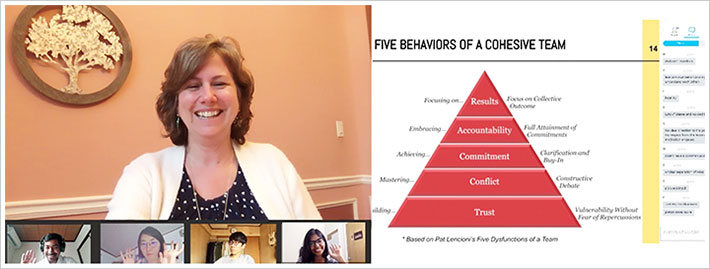
Snapshots of classroom
Interactive online sessions
Over the two months prior to the course, a lecturer and teaching assistant (TA) from Georgia Tech, faculty and staff of GSEC, and TAs from Tokyo Tech held several online meetings to discuss how to carry out online group work effectively and to develop a new application to enhance class commitment.
The course was organized in an active learning style, which presented challenges to both the students and the instructors. Students enthusiastically engaged in the session by applying an open mindset, new technology, and their time management skills — Georgia and Tokyo are 13 hours apart, so organizers decided to begin lectures at 8 a.m. in Tokyo and 7 p.m. in Atlanta. Despite the limitations of COVID-19, students gained leadership skills to collaborate in a multicultural environment through work with participants from diverse backgrounds.
Participants from diverse backgrounds
Joining the group of students in the course were two Tokyo Tech TAs, one from Brazil and one from Bangladesh, a lecturer and TA from Georgia Tech in the US, and a guest speaker from Vietnam. Japanese participants, consisting of students who have studied or are planning to study abroad, or who planned to participate in the leadership program at Georgia Tech last March, were eager to interact with their international counterparts and TAs.
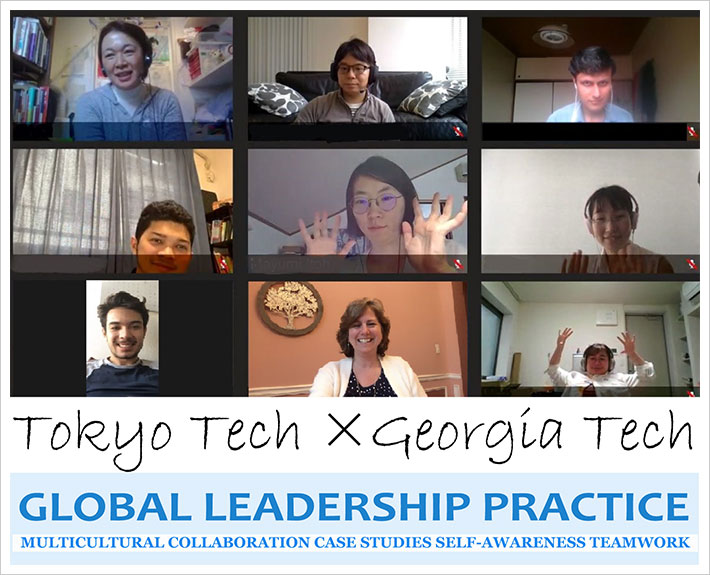
Diverse group of participants
Lectures in active learning style
Global Leadership Practice was developed based on the leadership program at Georgia Tech and was held in partnership with Georgia Tech for the third time. This year's course content reflected feedback from participants from the last two years. Before implementation, instructors from the two institutions planned and discussed the contents and pedagogy. In the US, a significant amount of tasks are assigned to students before and after each class, where active participation is expected. Students are asked to read a textbook on leadership, and to write blog articles based on personal leadership experiences. These practices were also adopted at Tokyo Tech.
Students were requested to attend an orientation session beforehand, where they received the course manual. This manual covered the main points of each lecture and assignments for the course, and proved especially helpful for Japanese students during group work and discussions with international students.
While the use of English and an active learning style throughout the course challenged some students, instructors made available various learning platforms to enhance active participation. Students were asked to use Pear Deck to share what they felt was the most important thing they learned from each lesson. During breaks, participants shared and listened to music through their computers. These activities helped students to get to know each other. The friendly atmosphere of the class and instructors resulted in active engagements for everyone.
The "100 Value Cards" assessment, utilized in face-to-face lectures in past years, was also developed for online use by a student who took this course in the previous year and provided it to the class. Through this assessment, students learned how to develop their leadership skills by focusing on their own strengths, values, and capabilities.
Learning from a multicultural team
Students learned how collaboration with team members can help extract these strengths from each member while transforming one's own values and goals into reality. Participants also learned how to adjust issues and develop problem-solving skills in a multicultural environment. Specifically, they were asked to develop some new equipment "to solve a problem in the world" in a short period of time with only 10 materials in their homes. Created products included an environmental bird feeder adaptable for climate change, a portable water purifier to improve sanitary conditions, a disposable smartphone case, a highly breathable antibacterial mask to deal with COVID-19 incidence, and a mascot to promote study abroad and enhance one of the group member's activities in increasing awareness among Japanese students at Tokyo Tech. Through this task, students learned how to build teamwork and leadership skills in order to realize a common goal within their group.
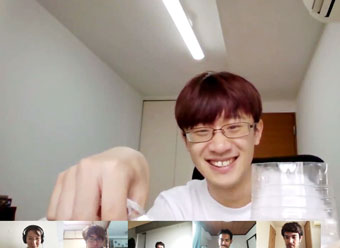
Bird feeder: Adaptable for climate change
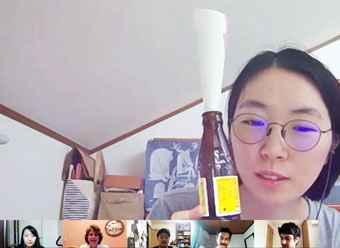
Making device to purify water
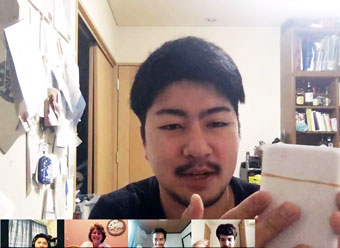
Disposable smartphone case
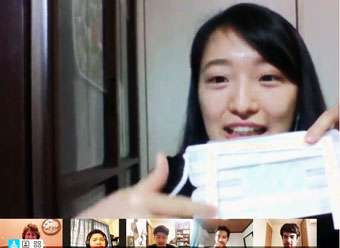
Highly breathable antibacterial mask
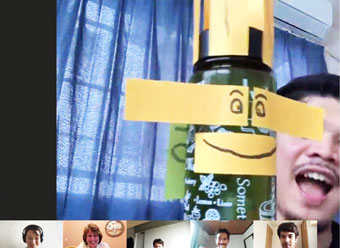
Mascot for promoting study abroad
Students also studied various kinds of leadership in different countries based on egalitarian and hierarchical concepts that take into consideration history, culture, and customs. The participants shared various types of leadership styles based on their experiences. It was understood from this session that decision-making styles differ from country to country, and students learned about the characteristics of each style along with ways to deal with unconscious biases.
Study of multicultural team building continued in the next session, which was led by Dr. Minh Nguyen, a Tokyo Tech alumni currently working for Google Japan Inc. After listening to Minh's lectures and experiences in both Japanese and multinational companies, students reflected on how to turn their ideas and goals into reality in terms of their own career development.

Dr. Minh Nguyen from Google Japan
Zoom party
During this course, students, faculty, and TAs traditionally hold a social gathering to deepen fellowship. This time, a social gathering was also held online for the instructor and TA from Georgia Tech who could not come to Japan physically. During the party, participants enjoyed various games and discussions about varying impressions and positive aspects of each country.
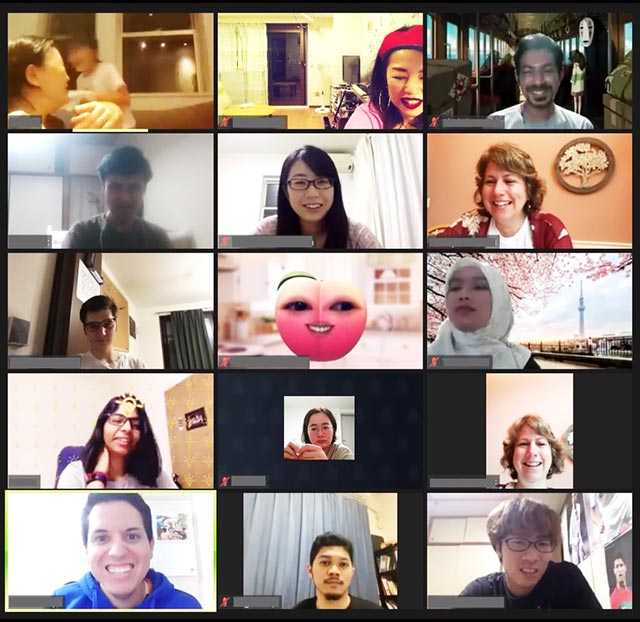
Zoom party
Final presentation session
On the last day of the course, five student groups presented their comparative analyses of two different leaders. Students spoke about the societal influence and leadership qualities of civil rights activist Martin Luther King, Jr., Chancellor of Germany Angela Merkel, former President of the United States Barack Obama, President Tsai Ing-wen of Taiwan, Inventor Nikola Tesla, IKEA founder Ingvar Kamprad, Alibaba founder Jack Ma, professional soccer player Makoto Hasebe, American scientist Anita Borg, and Tesla CEO Elon Musk. After the presentations, students discussed how they could apply their newly acquired knowledge on leadership to their own paths.
Overall, the online intensive course stimulated students and boosted their growth through a mix of lectures and active learning, challenging them to step out of their comfort zones. Instructors and TAs provided feedback on each student's learning and development after course completion.
Despite the challenges posed by the COVID-19 era, the Global Leadership Practice intensive course provided a beneficial learning opportunity for students to acquire a more international outlook regardless of their location.
. Any information published on this site will be valid in relation to Science Tokyo.











